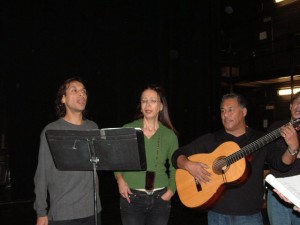
About the Westside Oratorio
WHERE THE RIVERS MEET By Anthony J. Garcia The confluence of two mighty rivers and the buffalo path, Caused the Arapahoe and Cheyenne to follow their food source. Thye camped in the lands in the early summer when food was abundant. Here they traded, and renewed themselves after a hard winter. The summer grasses were thick and the buffalo had grown fat, It was in this sacred triangle that life began, As it had been preserved for the ancestors before them They would gather to protect the land Reaching forward to provide for seven generationsThe Westside Oratorio is a beautiful, sweeping and poignant epic that boldly brings to life the stories of seven generations of Mexican-Americans who made West Denver, Auraria, their home; but whose drive to live, struggle and create is shared universally by marginalized communities. The Westside Oratorio is an original Su Teatro production by resident playwright and composer Tony Garcia in collaboration with Daniel Valdez of El Teatro Campesino who composed most of the music for the production thanks to a grant from the American Composers Forum Continental Harmony Project. The play made its world premiere in December, 2004. This year, the production is the result of a partnership with the University of Colorado –Denver Theatre Department. Daniel Valdez will be in residency through the end of the production. Students from Metro State College, Denver and Escuela Tlatelolco worked with Garcia and Valdez in 2004 to gather oral histories from Westside residents and to create the libretto for the piece. “What is being created in actuality is an historical presentation for voice of the Mexican-American’s migratory path through the Southwestern United States,” Garcia says, “It is not just the journey of this neighborhood, but of so many Mexican American families.” Valdez adds, “We are finding that the stories are universal in that they speak of the need for security, family and love. A better life for their children. Everybody wants the same things. Chicanos are no different.” Valdez continues, “ This process has taught me that even in the simplest of experiences that there is something greater that elevates our lives to a level of historical significance. This work is about simple people, our parents, with simple experiences that have tremendous historical repercussions on future generations, namely, us.”


